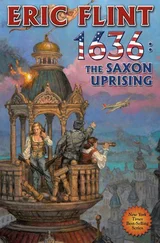Eric Flint - 1635 - The Cannon Law
Здесь есть возможность читать онлайн «Eric Flint - 1635 - The Cannon Law» весь текст электронной книги совершенно бесплатно (целиком полную версию без сокращений). В некоторых случаях можно слушать аудио, скачать через торрент в формате fb2 и присутствует краткое содержание. Жанр: Альтернативная история, на английском языке. Описание произведения, (предисловие) а так же отзывы посетителей доступны на портале библиотеки ЛибКат.
- Название:1635: The Cannon Law
- Автор:
- Жанр:
- Год:неизвестен
- ISBN:нет данных
- Рейтинг книги:3 / 5. Голосов: 1
-
Избранное:Добавить в избранное
- Отзывы:
-
Ваша оценка:
- 60
- 1
- 2
- 3
- 4
- 5
1635: The Cannon Law: краткое содержание, описание и аннотация
Предлагаем к чтению аннотацию, описание, краткое содержание или предисловие (зависит от того, что написал сам автор книги «1635: The Cannon Law»). Если вы не нашли необходимую информацию о книге — напишите в комментариях, мы постараемся отыскать её.
1635: The Cannon Law — читать онлайн бесплатно полную книгу (весь текст) целиком
Ниже представлен текст книги, разбитый по страницам. Система сохранения места последней прочитанной страницы, позволяет с удобством читать онлайн бесплатно книгу «1635: The Cannon Law», без необходимости каждый раз заново искать на чём Вы остановились. Поставьте закладку, и сможете в любой момент перейти на страницу, на которой закончили чтение.
Интервал:
Закладка:
True enough, they'd have to be careful in Rome, what with the Papal Inquisition right there on their figurative doorstep. But with some experience, Frank had come to realize that the "Inquisition"-the papal variety of it, anyway, if not the Spanish-wasn't actually the pack of slavering torturers he'd vaguely remembered from his up-time history reading. They could be awfully scary, at times, to be sure. Still, they tended to respect certain limits-and, whatever else, they weren't usually given to precipitous action.
Naples, on the other hand…
Naples was a political powderkeg. To make things worse-much worse-Naples had the Spanish army sitting on top of it. And the Spanish authorities, at times, were given to precipitous actions.
It wasn't simply an issue of their personal safety, either. As much as he tried to protect Giovanna, Frank understood perfectly well that engaging in revolutionary activity was inherently a risky proposition-and there was no way to keep Giovanna out of it, even if he was so inclined.
But Naples was a political mess, as well as a powderkeg. A city with a long-standing revolutionary tradition of its own, with a multitude of political tendencies and unofficial parties. From the standpoint of a fledgling Committee of Correspondence, just getting off the ground in Italy, it would be an inhospitable environment. They'd probably wind up spending more time quarreling with other revolutionists than they would getting anything productive accomplished.
"No," he said firmly. "Let's go to Rome."
Giovanna nodded. "I will speak to my father about it."
Maybe he'll decide to stay behind in Venice. But Frank knew it was a hopeless wish.
Rome
There was nothing unusual about an atmosphere of tension in the halls of the curia. If anything, Cardinal Antonio Barberini the Younger reflected, it would be a sign something was badly amiss if at least a few of the cardinals, monsignors and what-not present were not pointedly ignoring each other, barbing their comments or outright yelling insults. For a body that in theory was moved and guided by the Holy Spirit, it was usually infernally bad tempered.
And, of course, the last few years had been… more strained than usual. And the cardinal presently rising to speak had been the source of much of it. Or, at least, more of it than any of the other purple-clad mischief-makers Rome was home to.
Cardinal Gaspar Borja y Velasco. Like every other Spanish prelate, part of the government of His Most Catholic Majesty Phillip of Spain. This one in particular was a leading member of Spain's privy council, holder of enough offices to make him almost a quorum of government in his own right. He was also firmly in that part of the Church in Spain that regarded the church as an arm of the Spanish Government, and in a very real sense could not see where government left off and the church began, or vice versa.
Only two years before he had made it plain-loudly, publicly and with the crashing lack of tact that was practically the man's signature-that that view did not apply only to the Church in Spain. Two hundred years of being the only power in Spain whose writ ran untrammeled in every one of the kingdoms of Spain-even His Most Catholic Majesty had limits to his powers outside Aragon and Castile-two hundred years of inquisitorial power unmatched anywhere outside of the papal states, and the Church in Spain clearly believed it was time for the Roman dog to stop wagging the Spanish tail.
Unlike England a century before, they had the guns and ships and tercios to give their opinion weight, not least by reason of owning enough of northern and southern Italy that they had the Papal States in a strategic vise that they could screw closed at any time. What stopped them was a need, for the time being and only grudgingly recognized in Madrid, to maintain at least a passing semblance of obedience to Rome.
Not that that had stopped Borja from loudly condemning the See of Rome's inaction against Gustavus Adolphus, failure to burn Galileo like the heretic he plainly was, and willingness to appoint a near-Protestant like the American Mazzare to the purple.
The criticism of the failure to act against the Swede had been the only one Urban VIII had chosen to answer. He had, with some accuracy, pleaded poverty. A military undertaking that had strained the resources of the entire arrayed might of the house of Habsburg, with all their imperial dominions and an annual treasure fleet from the Americas was beyond the pope's means to put in any more than the proverbial widow's mite. Two million widow's mites, to be exact, but still a pittance next to the cost sunk in failing to stop Gustavus Adolphus from reversing every success of Catholic arms of the last fifteen years.
Still, it had been grounds for Borja to accuse the pope of being, in so many words, insufficiently Catholic. He had nearly been ordered out of Rome for that, and then his performance after the Galileo affair-which had, in truth, been a whitewash but it was tactless to say so-had got him slung out.
And now he was back. He had at least had the good grace to confine himself, before today, to sulking quietly in his villa on the outskirts of Rome, but he had not wasted his time back in Spain. If Vitelleschi's reports were right-and seldom were the Jesuit father general's formidable spymasters not in possession of accurate information-then Borja was here in the van of a small horde of prelates and cardinals, each of whom was coming to Rome to demonstrate how much more Catholic than Pope Urban VIII, ne Cardinal Maffeo Barberini, he actually was. And he had stopped off in Naples on the way here and apparently met with the duke of Osuna. What deal those two had done was anyone's guess. None of the channels of spycraft Barberini could access had been able to divine what had happened behind that closed door. But it was sure to be a devils' bargain for someone.
The Spanish prelates, meanwhile, had been arriving in Rome every few days for weeks now, all direct from Spain, and as soon as they had washed off the dust of travel had paid an immediate visit to that villa outside Rome, followed by long hours in closed sessions with their compatriots all over Rome. Barberini had engaged his own staff in imagining what they might be up to, in more detail than the obvious "no good," as had his brother Francesco Barberini. The results varied from the uncomfortable to the downright alarming. At the very least, among them they held enough offices and concomitant rights to intervene and interfere that they could tie up procedural business in Rome for months, slowing down the already ponderous curial bureaucracy to a pace that would make a snail look lightning fast.
And now Borja had presented himself for a session of the curia.
"It begins," the whisper came from behind Barberini. That was Ciampoli, Barberini's secretary, who had led the strategy sessions and had good reason to suspect the worst of Borja. Until the Galileo affair he had been a private secretary to the pope, a prestigious position, but the limited amount of damage Borja had been able to do had included impeaching the man away from direct papal service. Naturally, Barberini had grabbed him as quickly as he decently could. Talented, bright, learned in the sciences, he was visibly a coming man and had the skills Barberini recognized as necessary for what the new political winds in Europe would blow through Rome.
Borja began to speak. "If Your Holiness will permit?" he said, his pinched, ruddy and choleric face making a halfhearted effort at an unctuous smile as he awaited permission to speak.
Barberini looked over at his uncle the pope. His Holiness was his usual serene self, calm eyed and affable. Of course, with fifty years' experience of Roman politicking he would be giving nothing away, although he doubtless had more than just the dark imaginings of his nephew's own staff to inform his worries. Barberini recalled a remark made by the young American, Frank Stone, at whose wedding Barberini had officiated. "Just because you're paranoid, it doesn't mean they're not out to get you."
Читать дальшеИнтервал:
Закладка:
Похожие книги на «1635: The Cannon Law»
Представляем Вашему вниманию похожие книги на «1635: The Cannon Law» списком для выбора. Мы отобрали схожую по названию и смыслу литературу в надежде предоставить читателям больше вариантов отыскать новые, интересные, ещё непрочитанные произведения.
Обсуждение, отзывы о книге «1635: The Cannon Law» и просто собственные мнения читателей. Оставьте ваши комментарии, напишите, что Вы думаете о произведении, его смысле или главных героях. Укажите что конкретно понравилось, а что нет, и почему Вы так считаете.











